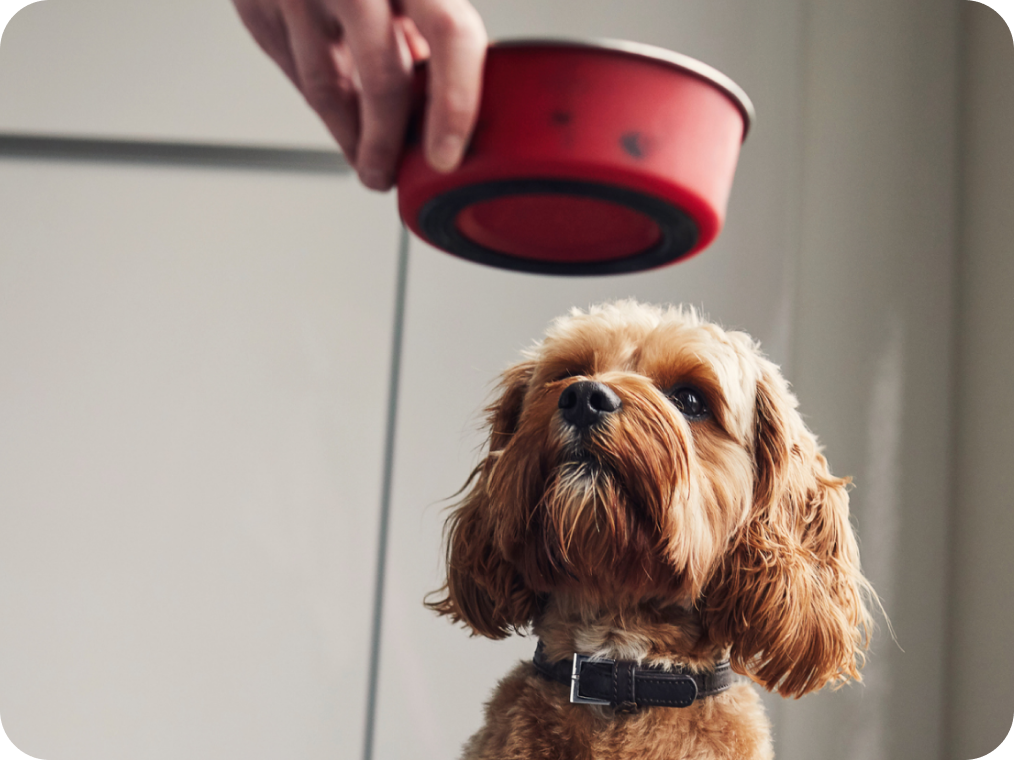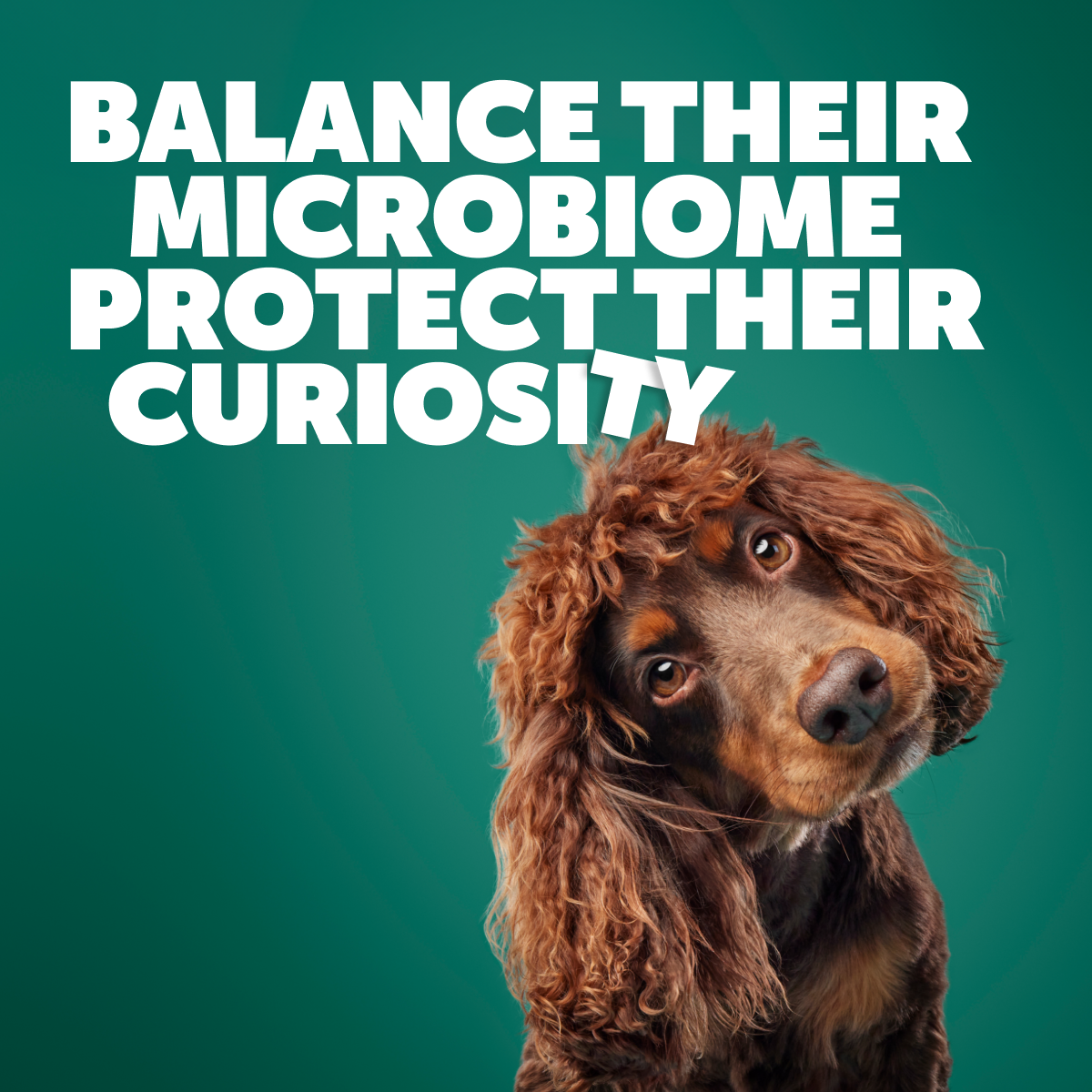GOOD GUT HEALTH SUPPORTS THEIR WHOLE BODY
Taking care of your dog’s gut can help them live a happier, healthier life. And it’s not just about firmer poos! Better gut health can have an impact on many aspects of their health and wellness.

WHY IS IT IMPORTANT TO KEEP YOUR DOG’S GUT BALANCED?
The gut microbiome is made up of microorganisms (such as bacteria) that help keep your dog’s digestive and immune systems healthy – with wide-ranging impacts on the rest of their body.
If there are more ‘bad’ microorganisms in their microbiome than ‘good’, it can cause an upset tummy, skin or joint issues, and even affect their behavior. On the other hand, keeping their microbiome ‘healthy’ or ‘balanced’ can help keep the whole body functioning properly.
THREE WAYS A BALANCED GUT SUPPORTS HEALTH AND WELLNESS

1. Supported immunity

2. Regulated behavior

3. Better digestion

TOP TIPS FOR TAKING CARE OF YOUR DOG’S GUT HEALTH

BALANCED DIET
A complete, balanced diet that includes adequate fiber and is tailored to their life stage will help support and maintain your dog’s gut and whole-body health. For more advice, read our article here.

FEEDING ROUTINE

REGULAR EXERCISE
GET MORE EXPERT ADVICE ON GUT HEALTH
- Mondo et al. (2020) Gut microbiome structure and adrenocortical activity in dogs with aggressive and phobic behavioural disorders. Heliyon. DOI10.1016/j.heliyon.2020.e03311
- Ambrosini et al. (2019) The gut-brain axis in neurodegenerative diseases and relevance of the canine model: a review. Frontiers in Ageing Neuroscience. DOIhttps://doi.org/10.3389/fnagi.2019.00130
- Jeffery et al. (2017) The association of specific constituents of the fecal microbiota with immune-mediated brain disease in dogs. PLoS One. DOIhttps://doi.org/10.1371/journal.pone.0170589
- Kubinyi et al. (2020) Gut microbiome composition is associated with age and memory performance in pet dogs. Animals. DOIhttps://doi.org/10.3390/ani10091488
- Garcia-Belenguer et al. (2021) Gut microbiota in Canine Idiopathic Epilepsy: Effects of Disease and Treatment. Animals. DOIhttps://doi.org/10.3390/ani11113121
- Kelley et al. (2012) Effects of Varying Doses of a Probiotic Supplement Fed to Healthy Dogs Undergoing Kenneling Stress. Journal of Applied Research in Veterinary Medicine. 10:3 205-216
- Rose et al. (2017) Efficacy of a Probiotic-Prebiotic Supplement on Incidence of Diarrhea in a Dog Shelter: A Randomised, Double-Blind, Placebo-Controlled Trial. Journal of Veterinary Internal Medicine. DOI10.1111/jvim.14666
- Lee. AH et al. (2022) Dietary supplementation with fiber, “biotics” and spray-dried plasma affects apparent total tract macronutrient digestibility and the fecal characteristics, fecal microbiota, and immune function of adult dogs. Journal of Animal Science 100(3). DOI:https://doi.org/10.1093/jas/skac048
- Kelley et al. (2009) Clinical benefits of probiotic canine-derived Bifidobacterium animalis strain AHC7 in dogs with idiopathic diarrhea. Veterinary Therapy. DOIhttps://doi.org/10.5167/uzh-31198
- Herstad et al. (2010) Effects of a probiotic intervention in acute canine gastroenteritis – a controlled clinical trial. Journal of Small Animal Practice DOIhttps://doi.org/10.1111/j.1748-5827.2009.00853.x
- Gomez-Gallego et al. (2016) A canine-specific probiotic product in treating acute or intermittent diarrhea in dogs. A double-blind, placebo-controlled, efficacy study. Veterinary Microbiology. DOI https://doi.org/10.1016/j.vetmic.2016.11.015
- Nixon et al. (2019) Efficacy of an orally administered anti-diarrheal probiotic paste (Pro-Kolin Advanced) in dogs with acute diarrhea: A randomised, placebo-controlled double-blinded clinical study. Journal of Veterinary Internal Medicine DOIhttps://doi.org/10.1111/jvim.15481
- Schmalberg et al. (2019) A randomised double-blinded placebo-controlled clinical trial of a probiotic or metronidazole for acute canine diarrhea. Frontiers in Veterinary Science. DOIhttps://doi.org/10.3389/fvets.2019.00163
- Arslan et al (2012) Therapeutic effects of probiotic bacteria in parvoviral enteritis in dogs. Rev Med Vet-Toulouse, 2(163), pp.55-9




